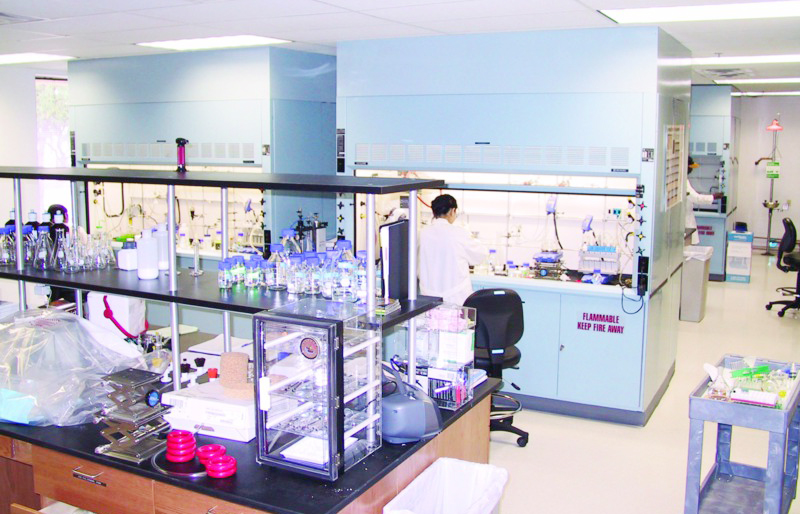2013-11-19
TenNor Therapeutics Develop Dual-Action Molecules
Finding a way out of the dilemma of drug resistance
Helicobacter pylori (Hp) is the main cause of chronic gastritis, gastric ulcers and gastric cancer, with an infection rate of over 50% in China. "However, for such a dreadful disease, there are no convenient drug sensitivity tests or therapeutic solutions to some extent," worried Dr. Ma, "As for the reason, the existing therapeutic regimens are too complicated, with poor therapeutic efficacy, more side effects and a high burden to patients."

Helicobacter pylori will causes partial gastric infection and the traditional prescriptions involve a long period of triple or quadruple drug therapy, which takes effect only after absorption by the system, going through blood circulation and returning to the abdomen, with a very small fraction of drugs exerting their antibacterial effects." These drugs are low in efficiency, have many side effects, and may lead to organ toxicity. Frequent drug use means high resistance of bacteria and statistics shows that the cure rate drops from 90% to about 60% after the introduction of standard triple therapy".
In fact the goal of TenNor is to solve such problems, and the key is to break the existing resistance and to find a way to overcome future resistance to new drugs. "The relationship between a drug and its molecular target is like that of a key to a lock," Dr. Ma tried to explain the theory. "The problem of old prescriptions is that one drug is only good for one lock and once the lock breaks or genetic variation occurs in a bacteria, the old key or drug doesn't work anymore. Our dual-target technology is like openning 2 locks with 1 key, when 1 lock cannot be opened, we can open the other lock for the door to sterilization, and the drug will lose effect only after both locks cannot be opened, that is both targets changes which is very unlikely to happen".
TenNor designed the dual-target molecular drugs, to effectively solve the problem of resistance, and significantly reduce the risk of future resistance. Moreover, they can hardly be absorbed and can therefore work directly on the stomach infected by H. pylori. With a high concentration and high level of antibacterial activity on the digestive tract, the drugs also have little impact on human organs. Dr. Ma said these dual-target molecules might solve the fundamental problems in treatment of H. pylori infection fundamentally, and provide a regimen to patients with high efficiency, low side effects, easy of use, and affordable pricing. "This makes it possible to eliminate H. pylori infection in large scale and to bring down both the thmorbidity and mortality of stomach cancer."
Identifying the root cause
In spite of its short history, TenNor has strong innovation strength and strong support. Its technical platforms, intellectual property rights, and drug candidates are provided by Cumbre Pharmaceuticals (US) through technical patnering. The company now has ten US patents, among which the three most important are under global protection.
However, the strong technical strength is only the beginning for TenNor to make innovations and breakthroughs. Starting with digestive diseases caused by H. pylori, the R&D team at TenNor is now reaching the research "feeler" out to other difficult gastrointestinal diseases such as hepatic encephalopathy and Clostridium difficile infection.
Hepatic encephalopathy is a condition caused by various factors under the complicated metabolic disorder of serious hepatic disease. Studies have shown the cause of this disease. Under normal conditions, blood ammonia will produce urea in liver, or glutamine in the brain, liver, kidney and other organs, to be excreted from kidney, lung, etc. "For hepatic disease patients, decrease in hepatic function will cause buildup of ammonia and other harmful metabolites, leading to hepatic encephalopathy", said Dr. Ma, "Clinical trials have shown that inhibiting the growth of harmful metabolites through regulating the intestinal microbial community structure with drugs will achieve the therapeutic goal from the root".
In recent years, Clostridium difficile infection (CDI) has been a complication frequently seen among patients during hospitalization, with a tendency of outbreak. One cause of CDI is the use of antibiotics, so it cannot be treated simply with antibiotics. Dr. Ma said that the drug developed by TenNor can identify the targets and kill Clostridium difficile, to improve the cure rate and reduce the side effects.
Developing the "Top level design" by industrial leaders
The research and development of TenNor is relevant to Dr. Ma's experience in research and development of drugs for infectious diseases in the US. He was graduated from the Chemistry Department of Peking University, received his PhD from the University of Connecticut and conducted his post-doctorate research at Boston College; and before returning to China, he served as Chief Science Officer at the Global Alliance for TB Drug Development funded by the Bill & Melinda Gates Foundation, worked at Abbott Laboratories for management of drug development and participated in founding Cumbre Pharmaceuticals. Dr. Ma admitted that the new drug development in the US is chiefly targeted at European and American markets, and seldom addresses the special diseases in Asia. The reason he returned to China and founded TenNor is to break the bottleneck in treatment of some severe diseases in Asia through technical innovations.
In the biomedical research and development, high ambition is far from enough, top innovative talents are required to form the "Top level design." TenNor has established the Science Steering Committee led by Dr. Wang Xiaodong, director of the National Institute of Biological Sciences and member of the United States National Academy of Sciences, with Professor Steve McKnight, world famous biochemist, member of the United States National Academy of Sciences and Chair of the Biochemistry Department, UT Southwesterm Medical Center, Professor Rich Losick from the Department of Cellular and Molecular Biology, Harvard University, world famous microbiologist, member of the United States National Academy of Sciences, and Professor Kenneth Chang, famous digestive expert from the University of California Erving School of Medicine, director of the Comprehensive Center for Digestive Diseases, providing support and guidance on medical research and development.
About TenNor Therapeutics
TenNor Therapeutics is a clinical-stage company specialized in the discovery and development of differentiated new drug products in diseases associated with bacterial infection and metabolism. TenNor possesses a unique multi-targeting drug conjugate technology platform and a strong new drug development pipeline with global IP protection. Several products are currently in late stage of clinical development or marketing application stage, targeting H. pylori infection, implanted medical device infections, hepatic encephalopathy and irritable bowel syndrome with diarrhea. The company is committed to address the unmet needs in the disease area and provide safe and effective therapies for patients in China and around the world.
For more information, please visit: www.tennorx.com


